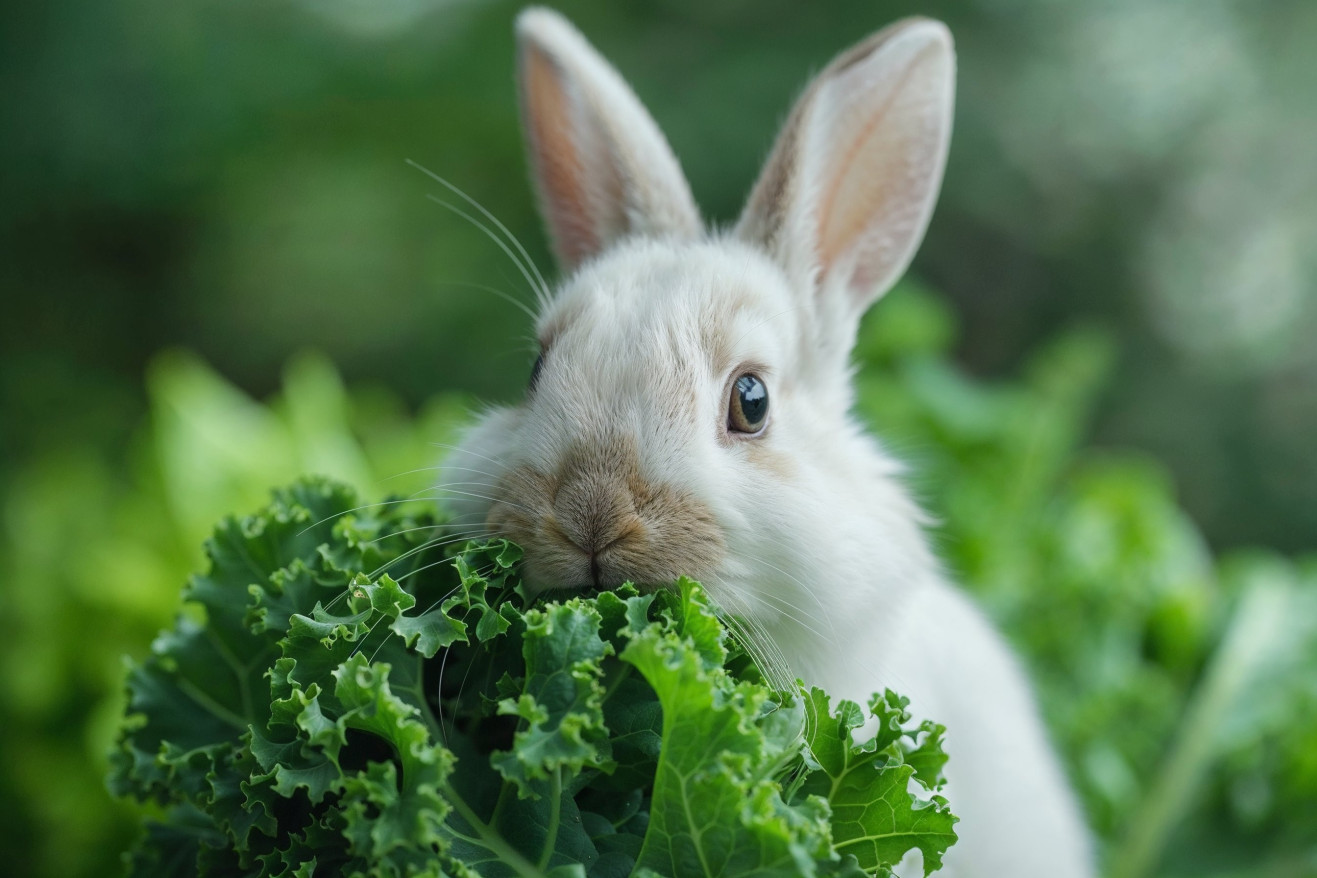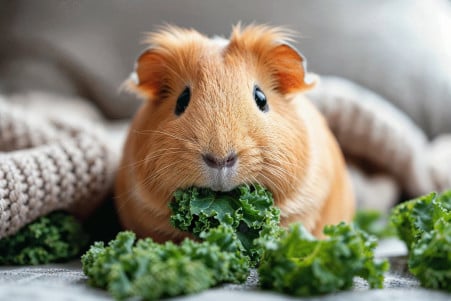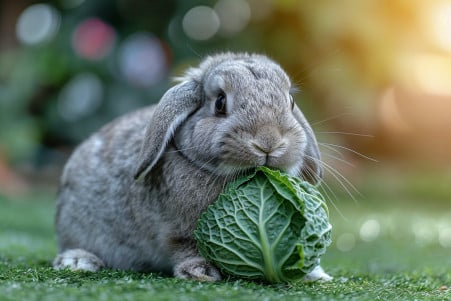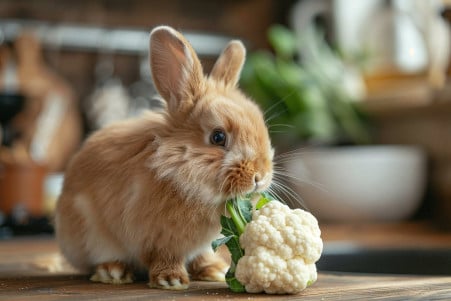Can Rabbits Eat Kale? Nutritional Guidelines for Bunny Diets
31 January 2024

Kale is a superfood for humans, but is it a healthy choice for your rabbit’s diet? Rabbits can eat kale in moderation as part of a balanced diet. You should introduce kale gradually to avoid digestive upset and ensure that it does not exceed 10% of your rabbit’s diet, due to its high calcium content, which can cause bladder issues.
In the following sections, we will examine a variety of studies from veterinary science, animal nutrition, and rabbit physiology to thoroughly understand kale’s role in a rabbit’s diet.
We will explore kale’s nutritional profile, the importance of dietary balance, and the potential health implications of feeding kale to your furry friend. By the end of this article, you will have a well-rounded view of how to safely incorporate kale into your rabbit’s meal plan for optimal health.
Can rabbits eat kale?
Nutritional Value: What Kale Adds to a Rabbit’s Diet
When fed in moderation, kale can add a lot of nutritional value to a rabbit’s diet. It is high in vitamins, especially vitamin K, which is important for blood clotting; one cup of kale contains almost 70% of the daily value.
Vitamin C, another vitamin found in kale, helps with collagen production and tissue repair. In addition, kale is high in antioxidants, including beta-carotene (which the body converts to vitamin A and is important for skin and coat health), lutein, and zeaxanthin, which are important for eye health.
While rabbits need the calcium and magnesium in kale for healthy bones and teeth, it’s important to feed it in moderation because too much calcium can be harmful.
Still, kale can help meet a rabbit’s nutritional needs when it’s fed as part of a varied diet, and it also contains other beneficial compounds that can help support a rabbit’s health.
A varied diet can also help keep rabbits interested in their food and prevent them from getting too much of any one nutrient. To make sure that you’re getting the most out of kale while keeping your rabbit healthy, feed it in moderation as part of a varied diet that includes many different vegetables.
A Healthy Diet: The Key to Rabbit Wellness
The most important part of a rabbit’s diet is hay, which should be offered at all times to help rabbits’ sensitive digestive systems and teeth, according to VCA Animal Hospitals. Hay is the best source of fiber, which is essential for keeping the intestines moving, so the RSPCA and Dr. Joerg Mayer both stress the importance of a diet that is high in hay.
Vegetables, like kale, are important for providing nutrients and keeping a rabbit’s diet interesting. However, they should be introduced slowly and in small amounts to avoid upsetting the rabbit’s stomach. To make sure rabbits get the right nutrients without getting too many calories or eating things that are bad for them, veterinarians recommend a diet that is made up of hay, a small amount of vegetables, and some pellets.
Of course, water is also an important part of this diet, and rabbits should only be given treats occasionally to avoid obesity and other health problems. As rabbits are introduced to kale and other vegetables, it’s important to make sure that they are healthy and adjust their diet as needed to make sure they live long, healthy lives.
Navigating the Risks: Kale’s Health Implications for Rabbits
While kale can be a healthy treat for rabbits, it’s important to understand the potential health risks that come with feeding it to your pet. Oxbow Animal Health explains that because kale is high in calcium, it can contribute to the formation of bladder stones or sludge, especially in rabbits that are prone to urinary tract issues. These problems can lead to pain, infections, and even require surgery.
When you first start feeding your rabbit kale, do so in small amounts to avoid digestive upset. A sudden increase in the amount of kale a rabbit eats can lead to digestive upset, including gas and diarrhea. In addition, the oxalic acid in kale, while helpful in small amounts, can bind to calcium and lead to brittle bones or anemia if rabbits consume too much, according to New Life On A Homestead.
To avoid these issues, make sure to watch your rabbit closely when you first start feeding it kale. Pay attention to their urination habits, any signs of pain, and changes in their stool, and adjust their diet as needed.
Make sure to feed kale in moderation, no more than once or twice a week, and mix it with other leafy greens to help reduce the risk of health problems while still allowing your rabbit to enjoy the nutritional benefits of kale.
How to Safely Feed Your Rabbit Kale
To avoid digestive issues, it’s important to slowly introduce kale into your rabbit’s diet. Pawmaw recommends starting with a small piece of kale that’s about the size of your rabbit’s head, two to three times a week.
After you give your rabbit the kale, monitor them for 24 hours. If they don’t experience any negative side effects, like changes in their stool or signs of discomfort, you can assume that the amount you fed them is safe.
The House Rabbit Society notes that it’s important to give rabbits a variety of vegetables to ensure they get all the nutrients they need. This means you should rotate kale with other vegetables like cauliflower, squash, or peppers to ensure your rabbit gets a wide range of nutrients and to avoid overloading them with any one nutrient.
You should also make sure that you’re feeding your rabbit a diet that’s no more than 15% non-leafy vegetables, according to Veterinary Partner.
Make sure that you’re still feeding your rabbit a diet that’s primarily made up of hay, with kale as an occasional supplement. Keep an eye on your rabbit for any changes in their health or behavior, and talk to your vet if you have any concerns. If you follow these guidelines, kale can be a safe and healthy part of your rabbit’s diet.
Conclusion: Can Rabbits Eat Kale?
To conclude our exploration of the world of kale and rabbits, it’s safe to say that while kale can be a healthy part of a rabbit’s diet, there are some things to keep in mind.
Make sure to use it in moderation to get the most out of its nutritional value while protecting your pet from the potential downsides of high calcium and oxalic acid. It’s important for responsible pet owners to introduce kale slowly and watch how their rabbit reacts to make sure it doesn’t cause any digestive issues.
It’s also important to keep talking to your vet, who can give you the best advice for your rabbit’s specific dietary needs. In general, a diet that’s mostly hay with a variety of vegetables, including kale, and plenty of water will help your rabbit stay healthy. By following the advice in this article, you can help ensure that your rabbit lives a long, healthy, and happy life.


